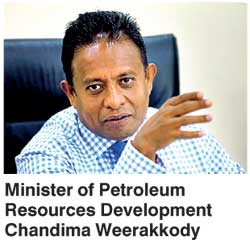Sunday Feb 22, 2026
Sunday Feb 22, 2026
Tuesday, 20 September 2016 00:05 - - {{hitsCtrl.values.hits}}
By Uditha Jayasinghe
The Government is putting the finishing touches on a Petroleum Resources Development Act to be submitted to Parliament in the coming months to revitalise oil and gas exploration, a top official said yesterday.
Minister of Petroleum Resources Development Chandima Weerakkody told the Foreign Correspondents Association (FCA) that the wide-ranging legislation would focus on three key areas and guarantee international standards and investor protection. In previous exploration efforts, the Government has been criticised for taking years to finalise deals even after companies have won bids, he  recalled, insisting the new Act was aimed at resolving such bottlenecks.
recalled, insisting the new Act was aimed at resolving such bottlenecks.
“We don’t have the money to invest but we have to convince the investors to do so. When they walk into Sri Lanka, they must feel that their investment is secure and there are international standards that are adopted in this field. As per the provisions of our Act, those international standards are maintained and we will be forming a regulator and a secretariat – to decide on policy – and a national oil company,” he said.
In addition to the three new branches under the Petroleum Resources Development Act, the Government will also formulate a gas policy with international expertise to guarantee adherence to global standards. Formulation of the gas policy will be done with assistance from British company IHS Markit.
“We will very soon be ready as a country to accommodate any international player or investor of any level to join hands with us. I must say that within a period of one year we have been able to bring in drastic changes into our exploration process, so I hope we are about to take off,” the Minister added.
Other than the fresh legislation, the Government has also entered into an agreement with global oil giant Total to study Sri Lanka’s seismic data. Weerakkody noted that both Total and Singapore-based Bona Vista would be studying exploration possibilities in Sri Lanka’s north and have already received Cabinet approval to begin operations.
However, Bona Vista is still seeking a financier for their operations and the Minister is hopeful a local company will step forward to fund them. In 2013 Bona Vista was given two blocks in the second bidding carried out by the previous Government under former President Mahinda Rajapaksa.
Cairn India, which won blocks in the Mannar basin during the first bid round in 2007 but pulled out last year, had left seismic data worth millions of dollars with Sri Lanka, according to Weerakkody. This material will also be shared with Schlumberger Ltd., which is the world’s largest oilfield services company.
“We have allowed Schlumberger to move in with an umbrella agreement to start its operations here. Cabinet approval has already been received. It will market the data and attempt to attract investors for explorations,” the Minister said.
Sri Lanka’s oil and gas explorations stalled after Carin India pulled out of its Mannar block in April 2015 after global oil prices nearly halved. Till that time Cairn was optimistic about its Mannar basin block and was planning to begin gas production from the block by 2017-18. In 2013, Cairn India completed appraisal and commercial studies to determine the next steps for the gas discoveries made on the block.
“Cairn is in discussions with the Sri Lankan Government to evaluate options for monetising the gas discoveries,” the company had said in its Annual Report 2013-14. Cairn had 100% participating interest in Mannar Basin block SL 2007-01-001.
Following the success of Phase-I exploration resulting in two gas discoveries in Dorado and Barracuda, Cairn had completed drilling of a fourth exploration well as part of the Phase-II exploration programme.
It had won the block in Sri Lanka’s first licensing round, in 2007, after competing with OVL and Niko Resources of Canada, making two gas discoveries there. Cairn had discovered two successive gas and condensate deposits in the Dorado and Barracuda wells in the Mannar basin. According to reports, the sites had reserves of around 74 million barrels of oil equivalent. Cairn had spent $150 million for the first phase and the following phases could have involved more investments, the company had earlier said.